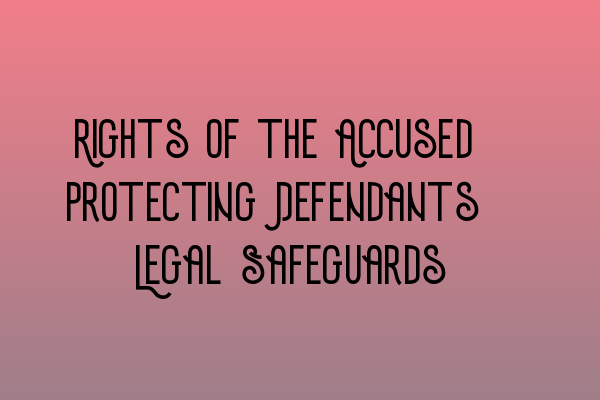Rights of the Accused: Protecting Defendants’ Legal Safeguards
When it comes to the criminal justice system, it is imperative that defendants are afforded certain legal safeguards. These safeguards are put in place to ensure that the accused receive a fair trial and are treated justly throughout the process. As a solicitor at SQE Criminal Law & Practice Law UK, I understand the importance of upholding the rights of the accused. In this blog post, we will explore some of the key rights that defendants are entitled to and how they are protected.
Presumption of Innocence
The cornerstone of the criminal justice system is the presumption of innocence. Every defendant is presumed innocent until proven guilty beyond a reasonable doubt. This means that the burden of proof rests on the prosecutor to establish the guilt of the accused. The presumption of innocence is a fundamental right that protects defendants from being unfairly disadvantaged.
Click here to access SQE 1 Practice Exam Questions to test your knowledge on this important principle.
Right to Legal Representation
Another vital right is the right to legal representation. Defendants have the right to be represented by a solicitor or barrister who can provide legal advice and defend their interests in court. This ensures that defendants are not left to navigate the complex legal system on their own and have access to a fair trial.
If you are interested in becoming a solicitor and want to prepare for the SQE exams, SQE 1 Preparation Courses are available to help you succeed.
Right to a Speedy Trial
Defendants also have the right to a speedy trial. This right ensures that individuals are not unduly detained or subjected to lengthy periods of uncertainty. A prompt trial allows defendants to present their case in a timely manner and avoid prolonged periods of pretrial detention.
Right to Confront Witnesses
The right to confront witnesses is another crucial element of fair trial rights. Defendants have the right to cross-examine witnesses presented against them. This enables defendants and their legal representatives to challenge the credibility and accuracy of witness testimony, ensuring a robust and fair examination of the evidence.
If you are preparing for the SQE 2 exams, consider seeking SQE 2 Preparation Courses to enhance your understanding of this right.
Protection Against Self-Incrimination
The right against self-incrimination protects defendants from being compelled to provide evidence or testify against themselves. This right ensures that defendants are not forced to potentially incriminate themselves and helps preserve the fairness of the trial process.
Right to Appeal
In cases where a defendant is convicted, they have the right to appeal the decision. This allows defendants to challenge errors or issues that may have occurred during the trial process. The right to appeal serves as an additional safeguard to protect defendants from wrongful convictions.
To stay updated with the latest SRA SQE Exam Dates, visit this link: SRA SQE Exam Dates
Conclusion
The rights of the accused are fundamental to a fair and just criminal justice system. It is crucial that defendants are provided with legal safeguards to ensure their rights are protected throughout the legal process. From the presumption of innocence to the right to appeal, these safeguards play a vital role in upholding the principles of justice. As legal professionals, it is our duty to advocate for and protect these rights.
If you are preparing for the SQE exams, check out SQE 1 Practice Mocks FLK1 FLK2 to enhance your exam preparation.
